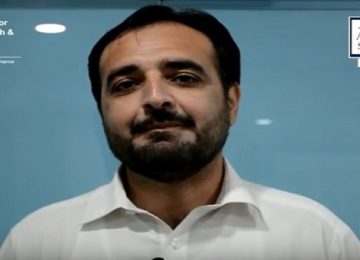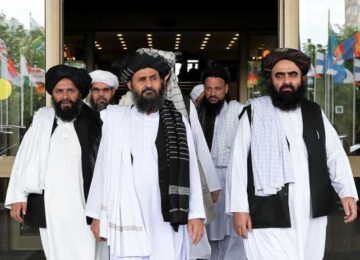After a temporary truce between the Afghan government and the insurgents during the three days of Eid-al Fitr, the brief euphoria is over, and the public anxiety has remained unchanged because more questions have arisen than any meaningful answers being addressed about the peaceful resolution of the conflict. However, the recent decision by US President Donald Trump’s administration to reply favorably to the Taliban’s demand for direct negotiation has created a new momentum.
In fact, after 17 years of a protracted war, US policymakers are having difficulty selling the war narrative to the political elite in Washington. Therefore, before a review of Trump’s strategy for South Asia in the next couple of months, the narrative of peace is being put forward in order to appease the war-weary American public.
Meanwhile, the Taliban have used the ceasefire as a public relations campaign to show their unity and strength vis-à-vis a weak government and a fragmented political coalition in Kabul. Also, their unrestricted entry into major cities, including Kabul, with their flag and weapons has had a significant psychological impact on the population, who are regularly reminded of the reality of the Taliban as a ruling force.
In addition, the insurgents have readopted their military tactic of hunting down Afghan forces in the places where they are the most vulnerable, and also they have returned to terrorist activities such as suicide attacks, one of their most effective weapons against the Afghan government and foreign forces.
Also, in the face of significant concessions from the Afghan government, they have not shown any desire to compromise when it comes to their core demands, which include the withdrawal of all foreign forces from the country. They also categorically refuse to recognize the government in Kabul and want control of the center of political power in Kabul.
However, the Afghan government not only lost the peace momentum because of the absence of a consensus among key members of the governing coalition, but the consequence of a military order to observe a unilateral ceasefire, which led to high number of casualties among Afghan forces, created panic and confusion among rank and file members of military units.
In addition, the Afghan political elite in Kabul, instead of closing ranks to make a grand political bargain with the Taliban, continue their infighting for a greater share of political power. In addition, the recent controversial arrest of a brutal militia commander by the government in Faryab province, which has led to public protests, is an indication that the central authority in Kabul has been challenged not only by the Taliban but also by all other major powerful political forces.
Furthermore, a deepening of the current political and ethnic crises has emboldened the Taliban and improved their legitimacy vis-à-vis a declining central authority in Kabul. Therefore, the Taliban could transform the current political environment to their advantage to reach out to minority ethnic groups and other political forces by offering them acceptable terms of peace, and thus further weaken the government’s bargaining position.
Moreover, the recent US concession to the Taliban has solidified public perception in Afghanistan that the current peace initiative is due to the United States’ abrupt change in its military strategy in Afghanistan rather than a concerted political effort by the government in Kabul. As I wrote it in my previous opinion article for the Asia Times, Will US negotiate an exit strategy with the Taliban, there are legitimate questions about the future of the constitutional political process and the fate of Afghans who favored the US military intervention in the country in 2001. Most Afghans vividly remember the Soviet Union’s premature military withdrawal in 1989, which precipitated the country’s descent into a bloody civil war.
In reality, many Afghans fear a Taliban vendetta, particularly those who have assisted the US military against the insurgents since 2001. Therefore, the pro-American political elite, and the Afghan security forces, chiefly the elite Special Forces, might pay the ultimate price. In addition, panic and fear about an eventual return of Taliban rule might provoke an unprecedented exodus from the country.
Indeed, the United States has a unique responsibility to prevent another bloodbath in the country, and direct US-Taliban talks are the equivalent of pushing the reset button for the current political process, known as the Bonn Agreement of 2001.
Therefore, in view of the current political and ethnic crises within the governing coalition, growing political revolts against the central authority in Kabul, and the undeniable reality of the Taliban as a major politico-military force, the time is ripe to search for a new political formula in Afghanistan.
This article originally appeared on Asia Times on July 18, 2018. Original link.
Disclaimer: Views expressed on this blog are not necessarily endorsed or supported by the Center for Research and Security Studies, Islamabad.








